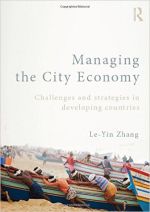Managing the City Economy: Challenges and Strategies in Developing Countries

In Managing the City Economy, Le-Yin Zhang provides a practice-oriented book about managing the city economy, especially in developing countries. Based on teaching materials from a master’s module she has been teaching since 1998, it is “aimed at present and future city managers…[or] those who have or will have some responsibility for looking after the economic performance of their city” (page 277). Zhang poses a central question: “How and to what extent can city managers help achieve significant progress towards authentic and sustainable development in their city (and possibly beyond) by managing the city economy more effectively?” (page 280). Taking an interventionist approach to the topic and exploring avenues that the state can take to effectively promote efficiency, sustainability and social justice in the city, Zhang does not present a fixed ideology regarding best methods to manage the city economy. Rather, she places an “emphasis on critically understanding and applying different perspectives to real-life situations concerning the city economy” (page xxii).
Made up of 18 chapters, the book is organized into five parts. The first part provides the context to give an understanding of the field. It “covers five broad processes: urbanization; the evolution of the capitalist economy; the ICT revolution; climate change; and democratization and decentralization” (page xxi). Following on, Part 2 attends to theory – looking at key theoretical issues surrounding the city economy and public intervention, as well as evaluating frequently used frameworks in urban economic analysis and management. Parts 3 to 5 discuss the practices of managing the city economy. They provide an array of case studies, each taking a different focus. Part 3 explores the challenges and strategies involved in managing sectoral growth, with particular attention to manufacturing, exports of services, transport and logistics, and real estate. Part 4 concentrates on the management of cross-cutting issues and thus the challenges and strategies relating to urban poverty, a low-carbon transition and the informal economy. Finally, Part 5 focuses on laying the foundation for long-term development. It explores city development strategies, safeguarding of municipal finance, and infrastructural and human resource issues.
To conclude, Zhang reviews previous chapters and synthesizes their key points in response to the book’s central question. She encourages current and future city managers to identify with the goal of authentic and sustainable development, as well as to look out for growth sectors, consolidate mature industries, and adopt a long-term stance on the city. Whilst sensitizing the reader towards current key debates, concepts and theories in the field, Zhang also encourages the reader to treat her book as “as a road map for more in-depth exploration” (page xviii).
Book note prepared by Hannah Keren Lee
Search the Book notes database
Our Book notes database contains details and summaries of all the publications included in Book notes since 1993 - with details on how to obtain/download.
Use the search form above, or visit the Book notes landing page for more options and latest content.
For a searchable database for papers in Environment and Urbanization, go to http://eau.sagepub.com/

